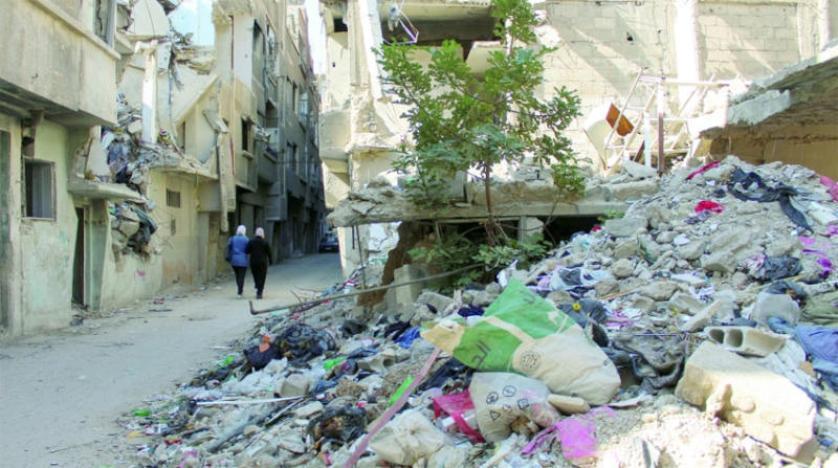Every time we think that the Syrian crisis has hit rock bottom, we discover that we’re wrong. The latest cholera outbreak in the war-torn nation and refugee camps in neighbouring countries is yet another evidence that the Syrian crisis is a bottomless abyss.
This was a Western diplomat’s comment after returning from Syria, a country he had visited from time to time in recent years as part of his work as an envoy.
According to the diplomat, years of war in Syria resulted in hundreds of thousands of deaths, half the population abandoning their homes, and more than seven million IDPs. Two million IDPs in Syria are staying at random camps, while around seven million refugees have sought asylum in neighbouring countries.
Moreover, Syria’s infrastructure has sustained severe damage, health services are near non-existent, schools remain shut, and the country is divided into three microstates hosting foreign armies and militias.
“We previously thought that the painful stalemate was the Syrian rock bottom, then the situation sank further with the spread of the coronavirus pandemic and the economic collapse in neighbouring Lebanon,” the diplomat noted, adding that the war in Ukraine had also increased the suffering of Syrians in all regions.
“The Ukraine crisis had overshadowed the Syrian crisis before the international community,” they explained.
Syria’s new rock bottom is a dire cholera outbreak. According to the UN, this epidemic is spreading rapidly throughout Syria and Syrian refugee camps, especially in Lebanon. More than 24,000 suspected cholera cases have been reported, infections have been confirmed in all 14 Syrian governorates, and at least 80 people have died.
The UN has raised the alarm, appealing to donors to provide funds for health services. But the latest numbers could have been promising. The money donors promised to deliver at the previous conference was about four billion dollars, of which only a third has been deposited. At best, half of the donations will reach Syria by the end of 2022.
Donor countries are preoccupied with economic crises, collapses, and pledges in the Ukrainian war.
Syria is already forgotten. For the first time, the Brussels Conference on Syria was not held on the sidelines of the UN General Assembly in New York. Also, high-profile political meetings on Syria were not convened.
Even the constitutional committee meeting, which included talks among the Syrian factions in Geneva, was shelved. Moscow had canceled the meeting in protest of the position of Switzerland and the West in Ukraine.
The illusion of a political process with international facilitation faded. The mirage of global sponsorship for the implementation of Resolution 2254 has dissipated.
In the face of US-Western divisions, Ukraine and global economic crises emerge as a priority, leaving no room for significant initiatives in Syria.
The greatest ambition for Syria now lies in small steps here and there. Neighboring countries are looking for steps to stop the Syrian crisis from slipping past borders. They are taking measures to stop drug smuggling, terrorism, and the positioning of militias.
Major powers lowered the ceiling of their Syrian diplomacy, searching for small trade-offs instead.
What can Moscow and Damascus offer if Washington and Brussels agree to increase the share of funds allocated to early recovery projects? What price can be expected if Washington exempts some medical gear from its sanctions list or if a European capital increases the number of visas granted to Syrian diplomats? What guarantees does Damascus provide if some refugees return?
Over ten years, the discourse around enabling “regime change” in Syria shifted to “changing Damascus’ behavior” and “improving the Syrian government’s conduct.”
Talk of dismantling refugee camps shifted toward improving the quality of these camps for the displaced.
As for the reconstruction of Syria, ambitious plans for rebuilding the nation were reduced to repairing a school here and there, renovating rooms in hospitals, extending water networks, or installing faucets in tanks.
Furthermore, UN Security Council permanent members are talking about improving humanitarian aid access across the lines between the three micros-states present in Syria instead of talking about a united Syria and complete sovereignty over borders and airspace.
Military contacts between the major and regional actors are no longer aimed at discussing military withdrawals and exits from Syria. Rather, they are limited to “preventing clashes” between them and finding mechanisms for “coexistence” between rivals.
In the face of such a scene, a cholera outbreak is hardly reaching the bottom line of the Syrian tragedy.
The Syrian Observer has not verified the content of this story. Responsibility for the information and views set out in this article lies entirely with the author.


